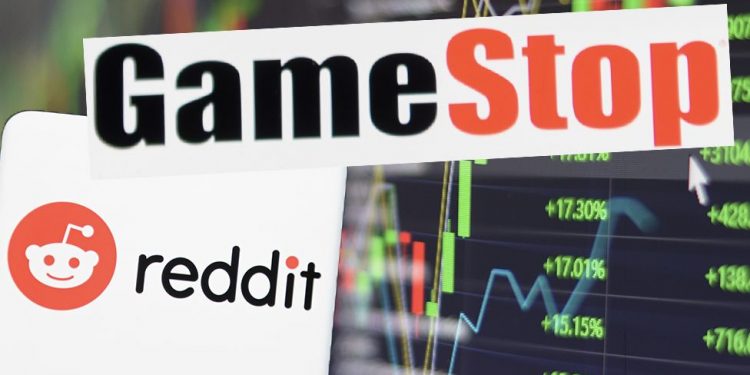GameStop Corp. is an American video game, consumer electronics, and gaming merchandise retailer and has one of the most widespread video game shops in the US. The company experienced a very difficult time during the pandemic as video game sales moved online and few investors expect it to thrive again.
Recently, GameStop made headlines after its share price surged in value by nearly 3,000% in January and gained hundreds of dollars in just a few days after a subreddit dubbed Wallstreet bets kicked off a movement to buy up as much of the company’s stocks as possible.
In January, GameStop stock, which cost just over $4 a year ago, was trading at $17 at the start of the month, and on Friday 12th Feb closed at $50.92—way down from its record high of $483!
According to CNBC, some people were able to get in on the Gamestop fiasco early on and got out in time to make money that they have used to pay off debt from loans to planning for a wedding.
What Happened
The big Wall Street firms or Hedge funds as they are known to have been betting against GameStop’s stock using a trading technique called short selling. Short selling allows investors to borrow other people’s stock, with the intent of lowering a stock’s value and sell them in the hopes of buying them back later at a profit. In short, when you sell short a stock, you’re looking to profit from a decline – rather than an increase in price.
Below is a simple explanation on short selling;
So users on Wallstreetbets found out that the hedge fund managers were trading more GameStop stocks than there actually were on the market. They then encouraged as many retail investors (trading through online trading platforms & mobile apps) as possible to buy GameStop stocks, therefore increasing demand and pushing the price upwards.
The hedge funds took positions betting that the company will fail. The hedge funds that had heavily shorted the stock lost millions and were left without stocks to trade, putting them at risk of bankruptcy.
When the price of Gamestop surged, the short-sellers (hedge funds) were forced to cover their positions by buy more stocks in order to minimize their losses.
Is the Gamestop situation possible in stocks listed on the NSE?
On paper, yes. But market the market conditions in Kenya and the US differ in a big way.
At the core of the GameStop situation is Securities Lending and Borrowing (SLB), a mechanism through which investors can borrow or lend shares to other market participants with a simultaneous agreement to return the securities either on-demand or at a future date. This lender can be any individual or institution holding a substantial number of shares on a long term basis.
The stock lending program, at the core of the GameStop situation, is not much active in the country. In Kenya, the Securities Lending and Borrowing (SLB) pilot window was only launched in August 2020 and does not see much activity.
However, the United States has a thriving market for lending shares. Short sellers can borrow shares for a fee, and sell them if they feel the stock is overvalued.
Can a stock rise as much as +700 percent on the NSE within a month?
Not possible because of intra-day circuit breakers, which limit the maximum fall or rise for stocks to 10 per cent over the previous day’s close. The circuit filter breaker is not applicable when a company announces material information such as earnings release, rights and bonus issues.
But even here, there is a probability that the regulator or the exchange may intervene if the extreme price movement persists.
How Shorting Works on The NSE’s derivatives Market
The good news is that an investor can take short or long positions on the Nairobi Securities Exchange Derivatives market, commonly known as the NEXT.
“The derivatives market offers investors a two-way market. You can make money if the stock goes up or down” Says Rufus Gitau, business development manager for derivatives at the NSE in a recent podcast with The Kenyan Wallstreet.
Locally, equity futures contracts are currently available for trading on the NSE and the specific futures contracts are Equity Index Futures and Single Stock Futures.
Example
Futures contracts only require a deposit of a fraction of the contract amount with a broker. Assuming an investor wants to get exposure into 1000 shares of Safaricom eg at Ksh. 30, he has the option of purchasing 1000 at Ksh. 30 (Ksh.30,000) or purchase a futures contract at the NSE.
To purchase a futures contract, the investor only needs to pay a good faith deposit to the Exchange that is refundable on close of the contract. The good faith deposit is referred to as initial margin and is about 10% of the exposure value (Kshs. 30,000). The investor will therefore be able to get exposure to 1000 shares of Safaricom through a futures contract at Kshs. 3,000 instead of paying the full Ksh. 30,000.
This assists the investor to manage his cost of funds appropriately. Investors can use futures contracts to speculate on the direction in the price of an underlying asset.
Futures contracts allow an investor to profit whether the price of an asset goes up or goes down. Whereas investors have only been used to making profit when the price of underlying security appreciates, the futures contracts allow investors to profit even when the price of a security declines, through a concept known as shorting.
ALSO READ;
US Markets; Fed Keeps Rates, FB, Apple & Tesla Earnings, GameStop Rally.
How To Make Money Trading Derivatives In Kenya




